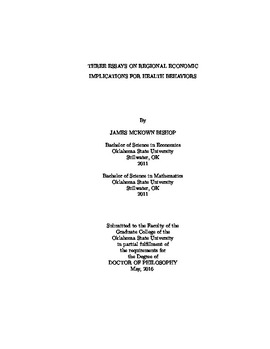| dc.contributor.advisor | Winters, John | |
| dc.contributor.author | Bishop, James Mckown | |
| dc.date.accessioned | 2017-02-22T22:08:34Z | |
| dc.date.available | 2017-02-22T22:08:34Z | |
| dc.date.issued | 2016-05 | |
| dc.identifier.uri | https://hdl.handle.net/11244/48783 | |
| dc.description.abstract | My dissertation comprises three chapters. The first two chapters examine how cigarette smuggling affects smoking rates, while the third chapter examines how com muting times and work hours affect sleep and sleep-related behaviors. | |
| dc.description.abstract | The first chapter measures how the effect of a state cigarette tax increase on smoking participation depends on the consumer�s opportunity to avoid the tax by purchasing cigarettes in the nearest lower-tax state. I show theoretically that a home tax increase should deter more smokers the higher the nearest lower tax. I confirm the theory using health survey data from 1999 to 2012 with a standard fixed effects model, taking advantage of county-level identification to measure the distance to the nearest lower-tax state. I also find that tax increases diminish in effectiveness as a tax rises. I observe that nearest lower taxes rose just enough over the period to maintain the effectiveness of a home tax increase at the yearly means. | |
| dc.description.abstract | The second chapter tackles the same research question as the first, but with a novel methodology. Instead of using the standard fixed effects model, I compare counties on the high-tax side of a state border to counties on the other side of the same border and to counties that are not near a border before and after tax increases. This invites an empirical framework known as triple differences, or DDD. Compared to those in the first chapter, estimates using the DDD methodology imply an even stronger effect of cigarette smuggling opportunities on smoking participation. | |
| dc.description.abstract | The third chapter examines the relationships between commuting, working, and sleep. I complement health survey data on sleep with county level averages of hours worked, commute time, and the prevalence of early and late commutes. As expected, I show that working and commuting for longer hours and at stranger times negatively affects the sleep behavior of workers, but I estimate no significant effects on non workers. I also find stronger effects for women. | |
| dc.format | application/pdf | |
| dc.language | en_US | |
| dc.rights | Copyright is held by the author who has granted the Oklahoma State University Library the non-exclusive right to share this material in its institutional repository. Contact Digital Library Services at lib-dls@okstate.edu or 405-744-9161 for the permission policy on the use, reproduction or distribution of this material. | |
| dc.title | Three essays on regional economic implications for health behaviors | |
| dc.contributor.committeeMember | Rickman, Dan | |
| dc.contributor.committeeMember | Azam, Mehtabul | |
| dc.contributor.committeeMember | Lusk, Jayson | |
| osu.filename | Bishop_okstate_0664D_14546.pdf | |
| osu.accesstype | Open Access | |
| dc.type.genre | Dissertation | |
| dc.type.material | Text | |
| thesis.degree.discipline | Economics | |
| thesis.degree.grantor | Oklahoma State University | |
